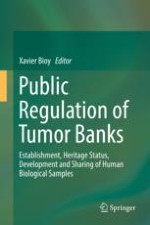2018 | OriginalPaper | Buchkapitel
2. Biological Samples and Their Sampling Degrees
verfasst von : Thibaut Coussens-Barre
Erschienen in: Public Regulation of Tumor Banks
Aktivieren Sie unsere intelligente Suche, um passende Fachinhalte oder Patente zu finden.
Wählen Sie Textabschnitte aus um mit Künstlicher Intelligenz passenden Patente zu finden. powered by
Markieren Sie Textabschnitte, um KI-gestützt weitere passende Inhalte zu finden. powered by
